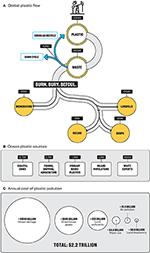How a voluntary industry contribution can transform the plastic economy
Plastic pollution is found in the deepest depths and the highest highs of the earth’s surface. Forrest et al. summarize how fuel-derived plastics (FFP) are more than a marine pollution issue, arguing that FFP invades bodies, causing disease and dysfunction in addition to social conditions akin to slavery, for the workers picking through our waste.
Authors
Andrew Forrest, Luca Giacovazzi, Sarah Dunlop, Julia Reisser, Alan Jamieson, Jessica J. Meeuwig.
Highlights
- Fossil fuel-derived plastic (FFP) production rates are growing rapidly. Without proper recycling, the fragmented and dangerous plastics accumulate in our oceans, soil and air, jeopardizing first marine life and ultimately humans.
- This article reviews the global costs of plastic pollution and offers a solution driven by a voluntary contribution by the industry.
- The authors suggest applying a voluntary contribution to FFP at first production, as a price premium on raw resin. This cost will trickle down, encouraging all steps in the value chain to reduce plastic use and narrow polymer usage.
- The solution can materially improve polymer-to-polymer technology and encourage to keep plastics within the economy.
REASEARCH BRIEF
The Plastic problem
The negative impacts of FFP range from the most visible effects, such as entanglement and harm to marine megafauna, to microplastics and nanoplastics, causing ecotoxicological risks, increasing mortality and inflammation rates, oxidative stress, and reducing fecundity and reproduction. The failure to account for full cost of FFP manufacture, usage and disposal is the core of the problem of the global plastics economy.
The problem cost
The annual cost of the current linear plastic economy is over 2.2 trillion USD, a conservative estimate due to many unknowns. For example, impacts on human health such as inflammation and cell damage in skin, lung and brain cells, are not fully quantified. Further research is urgently required to fully understand the full impacts and costs to ecosystems and human wellbeing.
“Most of the costs from plastic pollution results from impacts on our oceans; 1.5 trillion USD is lost due to reductions of oceans production capacity in economic, social and environmental terms.”
The moral dimension of the accountancy failure in the plastics economy is also important. Profits are often gained in high-income nations while the costs of disposal, burning, dumping, are carried by low-income countries. The latter also carry the burden of human health impacts for the 15-20 million workers in the informal recycling sector. This disconnection, where the costs are invisible for the rich consumers, hinders the needed behavioral change.
“Due to a model of plastic waste management that is more “burn, bury, befoul” than “reduce, reuse, recycle” annual costs of over 730 billion USD are lost in the upstream cycle of FFP production.”
The key barrier for the circular plastics economy is that the recycling technology cannot compete with the continuously low cost of producing FFP from virgin materials.
The solution
Clean–up technologies, reduction of plastic consumption or conservation efforts will not be the full solution. This problem requires a framework change, ensuring a truly circular FFP economy by undoing the market failure of ignored external costs.
Extended Producer Responsibility and plastics related legislation have made small positive inroads, but system–wide change is needed. The research team proposes a voluntary contribution from the industry that will even out the price difference and the playing field. The contribution can be collected already at the start of the value chain where plastic resin, the “plastic products’ building blocks”, are produced. This is the most transparent point in the value chain, with relatively few actors on the global scale. The contribution will be based on a per-weight basis, and distributed out on producers, packaging companies, retailers and subsequently end-consumers to spread the cost. This will be governed by a global audit system, and the authors suggest supporting it through block-chain based certification process or chemical signatures. This could be supported by a global Producer Responsibility Organization, that could ensure efficient governance and management.
“The capital raised by the contribution is estimated to reach at least 20 billion USD annually, and thereby eventually possibly exceed the needs of the industry, to rather be redistributed to combat other impacts of the fossil fuel industry.”
Main findings of the article
- There will be a need for a facilitated, industry-wide transition from a linear to a circular economy where business models must fundamentally change. The start of the value chain is the most effective point of intervention. Petrochemical companies are the key to ensure circularity and should be key contributors to the system change.
- The authors’ estimates for the contribution lies in the range of US$ 200 – 5,000 per tonne depending on the type of polymer, equal to between ∼20% and 500% of the cost of FFP resin.
- The Contribution would turn used plastic into a cashable commodity, rewarding recovery and recycling. The improved profitability of polymer-to-polymer technologies will make the used plastics value chain more efficient. In addition, the Contribution will support scientific advances in the development of materials through investment and increase in demand, as well as greater use of purification, depolymerization and pyrolysis technologies.
The authors argue that a failure to act from the industry would only force disperse policy processes, taxation, regulation or treaties with less control and oversight, and more costs and administration between markets and across borders. Self-governed industry initiatives have proved successful for cost recovery in other industries. The initiative should, however, work complimentary to regulation and other intervention.
In sum, the suggested voluntary contribution from the industry could limit plastic pollution, create economic opportunities across the value chains, as well as finance the remediation of already affected ecosystems – at a greater pace than the current policy developments allow.

Fig 1. The plastic problem (see publication for full description)
Full article available here.
Supplementary material to the article available here.